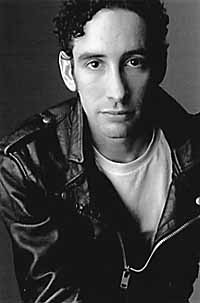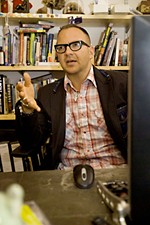Why We Listen to What They Say
By Jon Lebkowsky, Fri., April 23, 1999
 Doug Rushkoff has been writing about media, cyberculture, and rave culture for several years now, starting as a geeky idealist and evolving into a perceptive cultural critic with an international reputation. Earlier in this decade, he was a raver and explorer of psychedelics who was with Timothy Leary when he died, but these days, he is perhaps the most influential nonacademic media theorist in the United States. Through his books, especially Media Virus and the upcoming Coercion, he has explored how media new and old cultivate, manipulate, and coerce the collective will.
Doug Rushkoff has been writing about media, cyberculture, and rave culture for several years now, starting as a geeky idealist and evolving into a perceptive cultural critic with an international reputation. Earlier in this decade, he was a raver and explorer of psychedelics who was with Timothy Leary when he died, but these days, he is perhaps the most influential nonacademic media theorist in the United States. Through his books, especially Media Virus and the upcoming Coercion, he has explored how media new and old cultivate, manipulate, and coerce the collective will.
In person, Doug's an upbeat guy with a ready smile. If you take your traditional stereotype of East Coast intellectual, search angst and replace it with ecstasy, you'd have somebody like Doug. These days, he has reason to smile; his recent novel, Ecstasy Club a book author William Gibson calls "a brave, very funny, very knowing trip through the neo-psychedelic substrate of the wired world" was recently optioned for film. His latest book, due out this summer, is called Coercion: Why We Listen to What "They" Say. Recently, Doug was in town for the SXSW Interactive Festival, where he presented a panel entitled "How the Free Market Enslaved the Net." We spoke with him over barbecue. Our discussion, like Doug's career, began with early Nineties rave psychedelia and wandered almost casually into a critique of late-Nineties media.
The Austin Chronicle:What do you think got lost between the Sixties and the Nineties?
Doug Rushkoff: Any vision of what the counterculture wants. In rave culture, it was transcendence at all costs. We were going to transcend, we were going to push the pseudopod, break on through to the other side without any sense of what that other side might be. We intentionally avoided talking about politics and social issues. We didn't want to ground something so important in a particular agenda.
AC:But eventually politics catches up with you, right?
DR: Which is why the counterculture wants to avoid agendas at all costs, avoid co-optation into the system, even as the antagonist to the system. To avoid co-optation, to avoid mainstream popularity, we've got to put up barricades.
AC:You said earlier how "we" were going to do this or that. It seems to me that part of the problem is in defining who "we" are.
DR: It's supposed to be everyone, right? That was one of the ideas of rave, anyone can come. It's not like one of those clubs with lines outside, where they just pick the ones with the good clothes. It's gonna be everybody. But once everyone started to come, raves started to die (laughs).
AC:Same lesson with online communities: You throw open the doors and invite diverse people in, make a big splash, and suddenly you've got this stampede. How do you manage that?
DR: You get the stampede when people think there's free sex. Everyone knows sex is what made the VCR happen. Sex is what brought all the cads to the acid parties in the 1960s. They'd think, "Oh, wow, these girls are going to be tripping. I can get laid." As anyone who was in the Sixties tells it, that was what destroyed it, all these groping guys.
AC:But there were a lot of us who, when we talked about sex and free love, envisioned this remarkable union where you would, for hours and hours, become one.
DR: That's what Ralph Abraham was telling me about, that it would be 16 people in this weird group-being thing, sexing, tripping, whatever it was. But then, when one guy tells his friend about it, and he tells his friend about it, it's like, "Where's the next one gonna be, buddy? Har-har." All those alt.binaries places exploded Internet membership, sex chat, and all that. Rave culture, too. Figuring there'd be a lot of pretty girls, 16 or 17 or 18 years old, on Ecstasy, which is a love drug. They were very impressionable, and you could get in and get a piece. It was traditional club values. Then Ecstasy was replaced by speed, which, as you know, is a very different state of consciousness, an aggressive, territorial, me-centered state.
AC:You're talking about the big party, and it's like the problem with democracy, which is a difficult concept.
DR: Especially for us elitists, right?
AC:Well, you throw a party, and you invite everybody to come, and you really have a good heart, you really want it to work. But the thing is, how do you accommodate the diversity, and how do you accommodate the fact that some people have bad intentions?
DR: There's so many models, even biological models. You figure we're all one body, right? And every person's a little cell. So okay, I want to have a gathering of cells, the good ones. Not the pimple cells and cancer cells, I just want nice ones coming in. And you know that after a certain point, you can invite maybe one or two negative people, and then hope the energy of the good group heals those people, or brings them around somehow.
But you invite five or six or seven, and you crash the whole thing, and it makes you feel really shitty. I always used to tell myself that I never want to live a life where, if I was tripping, I'd look at stuff and bum out. And one thing that does bum me feels like a lingering elitism ...
AC:Within yourself?
DR: Yeah! I want to hang out with certain people, I don't want to hang out with others. But on another level, well ... shit, I'm a human being, I'm only on this earth for so much time. It's easier to look at images of starving people than images of fucked-up people. With starving people, at least you can say how do we get them food? What can we do? But what can you do about fucked-up people? And unfortunately, maybe half the people in our culture are fucked-up people. I mean, I'm fucked-up in my own little ways. But there's legions of unconscious people, people who are what I would call coerced by corporate America, coerced by television, coerced by the very systems of logic they've succumbed to.
AC:The corporate veil of unconsciousness is really not a new thing. This is what Gurdjieff and others were talking about, the human tendency to focus on survival to the exclusion of everything else. It's really just a lack of a meta-state for your vision, your context.
DR: And that's why I think media is a positive thing. On the one hand, media allows you to reach more people than you can just talking, and it also allows you to reach them at an arm's length. If I can print a book of 10, 20, 30 thousand copies other than the 10,000 who buy just because they want to read something they agree with, another 10 or 20,000 people read a book because they want to be changed a bit. They want to be empowered.
AC:It's a way to have many conversations without being channeled to death.
DR: Right. And I avail myself of the so-called masses all the time. I am in public, I am available, my phone number is listed in New York, I get two or 300 e-mails every morning, I answer them all from six in the morning 'til 10. No matter how seemingly stupid or ill-informed the question might be, I'm there. I go to almost every conference that asks me to come, pay or no pay, to the point where it will make my work suffer. To the point where I realize it's inefficient. Last year I went to so many things: I went Europe 20 times, went to Australia twice, and I wasn't getting my work done ...
AC:No continuity, right?
DR: Right. So I ended up taking three months off the circuit to get the Coercion book done. And then, with three months off the circuit, I realized that there was actually a huge component missing from my entire value system. I was missing the ideas of home, family, taking care of oneself, an ethical template that's arrived at via the consensus of a community rather than an individual head thinking alone at home. So I'm trying now to travel only once a month to whatever's going to hit the most people, or hit in the most meaningful way. And I go to temple on Friday nights and Saturday morning. Rather than just touching souls, I'm trying to actually find a woman I could be with in a good, long-term relationship that gets more intimate over time.
AC:We should talk about your next book, Coercion.
DR: It's actually called Coercion: Why We Listen to what "They" Say, with "They" in quotation marks. It's an anti-conspiracy-theory book. I tell how conspiracy theory got started. I'm talking about Who are They?, and How do you get to be a They?, and What is the result of there being so many Theys in our culture? There's an underculture who believes They are allied and out to get us. "They" is a marketing strategy; that's all it is. "They" is something we voluntarily accept, because we like Theys.
AC:I started to say it's more like mythology, but then I realized mythology is a marketing strategy.
DR: And some of the mythologies can be positive ... or they can be negative. I look at the Jewish mythology as positive, because it's designed to impart an ethical and a moral tradition, and have it last through generations. The mythology of the Jolly Green Giant or Ronald McDonald or Tony the Tiger or Joe Camel might be perpetrating what I would consider a more negative or destructive value system. But they generally work and perpetuate themselves in the same ways. There was a New York Times article that said I was a corporate consultant making $7,500 an hour, which wasn't true, but Wired News picked it up, and Carl Steadman, of all people, started saying Rushkoff is an evil corporate guy, he's making all this money. And after it was in Wired News, I started getting calls from corporations asking me if I would consult to them for $7,500 an hour. I would go there and basically give them rave philosophy. Or media literacy philosophy that people don't want to be coerced by their media anymore, and the minute that they sense that you're trying to pull something on them, that you're trying to coerce them, or you're trying to make them tense, they're going to click away with the remote. I would basically just recite sections of Media Virus. If they want to pay $7,500 rather than $22 and read the book.
AC:Did they buy the philosophy?
DR: Oh, yes. I started to see commercials that were created by some of these companies based on the things that I would say. I would start to see media virus campaigns out there, like the Calvin Klein child porn thing that happened a couple of years ago, which is basically a media virus to get more exposure through coverage about the ad, than from the ad itself. And it makes Calvin look cool in the process, because he's doing radical things.
Or these Sprite commercials that are supposed to be anti-commercials by saying image is nothing, thirst is everything. That's appealing to Gen X ironic detachment. We're supposed to reward them for being detached. And I realized as I was consulting to these companies that there's an arms race going on. It's as if they develop a coercive strategy, then we, the consumer, or the media watcher, or the employee, or the union develops a countermeasure to that. And then the countermeasure works for a while, like Generation X and grunge culture and all that ... even the Internet itself ... these were all countermeasures to advertising culture and corporate culture. But then they develop a new counterattack to our countermeasure, like making advertisements that make Sprite look cool. As the cycle goes on, they start to look more and more real, as an actual force, rather than just as a random corporate chaotic system that uses a shotgun approach to do whatever works against us. And we start to feel like we're an army, which leads to more paranoia.
AC:It's like taking chaotic forces of nature and identifying them as a god or gods.
DR: And what happens is that, because we have technology now, we've got companies like Prism and Donnelly that are doing target marketing and readjusting campaigns almost in realtime based on what they're learning about us. But then you realize that there is no They there. I've been in all these companies, I've been in the research firms. I've been at Donnelly, I've been at Prism, I've been in Ogilvy and Meador, I've consulted to Young and Rubicam ... there is no They there. Same with corporations. Rupert Murdoch isn't in charge; he's beholden to his shareholders, half of whom are his employees. What we've done is automated the coercive cycle. It's really more an economic argument at this point than it is an us-or-them political argument. We've automated an economic engine, we've automated the short-term bottom line, to the point that we're destroying the civil society.
So then I start saying how we don't trust each other any more, how we're growing more paranoid, how we have nightmare visions like X-Files and Millennium. And at the very end of the book I say how we're all coercers, and we're all coerced. For every time we're afraid, we're also thinking of a way to create a banner ad that's going to get some good traffic to our site. Or what's the title of my book going to be that's actually going to hit people, what color should the cover be that's going to help people want to read it?
When I'm around people who have big houses and nice cars, and have what seems to be a much more secure lifestyle than I do, and bigger, better, faster stuff, I started thinking, "What could I do to become one of them?" But why do I want to be like them? I realize I am so coerced. What is it about these lawns, lawn after lawn after lawn, these big houses, that makes me want that so bad? Well, it would be more secure, wouldn't it? If there's a crash or something, I'd be secure; if there's a revolution, I'd have a bigger piece of land. But that doesn't really make sense. Would the moment-to-moment experience of life be any different?
AC:You'd be less tense.
DR:Would I ? I argue that I wouldn't, because I'd have more to protect.
AC:There's a movie called Office Space, directed by Mike Judge, where the premise is that this fearful corporate droid, because of an aborted hypnotherapy session, remains in a totally hypnotic state, and he's absolutely not tense. He doesn't care whether he keeps his job or loses it or whatever. He goes to work when he feels like it and sleeps when he feels like it. And his life is 1,000% better, because he's without fear, therefore he can't be manipulated.
DR: Yeah, tension is the way we get coerced, basically tension and confusion. The old way was tension, the new way is more like neuro-linguistic programming, hypnotizing people in realtime. And then you see people doing it in a bar to pick up girls and can hear them using nested phrases that they've gotten out of these books.
AC:You start out with a vision of a way to make things better, but you can't. We're not going to bring on the revolution, we're not going to change things, because forces of nature and our own essential humanness are beyond us to change.
DR: Ah, but they're not beyond us, indelibly! I do believe in evolution, that things get better over time.
AC:But not because you and I changed it necessarily.
DR: We have our effect, but it's not even that. I realized so profoundly at the end of working on this book that I'm the one who's got to change. It's me. I don't mean staring at my navel within, going to a Buddhist retreat. I mean changing the way we each live our lives in a tiny way.
AC:Buddhism is actually more aligned with what you're saying. The Buddha's realization was that you don't have to be ascetic ... you don't have to lose the meat in order to achieve realization. There's a middle path between the totally worldly and the totally spiritual.
DR: That's what earth is: the middle path. I mean, for humans, anyway. What the Jews would say is that human beings have an angelic nature mixed with an animal.
AC:And the animal is the "bad" part.
DR: But it's not bad ... it's just there. That's why you can't look at God, because your animal part would just get burned off and die. Robert Frost said, when they asked him "What's the meaning of life?," and he said, "Life is God drawing matter up to himself." Today everything is pagan, life is matter reaching up. But God drawing matter up, it's very Judaic. I kinda like it, though (laughs).








